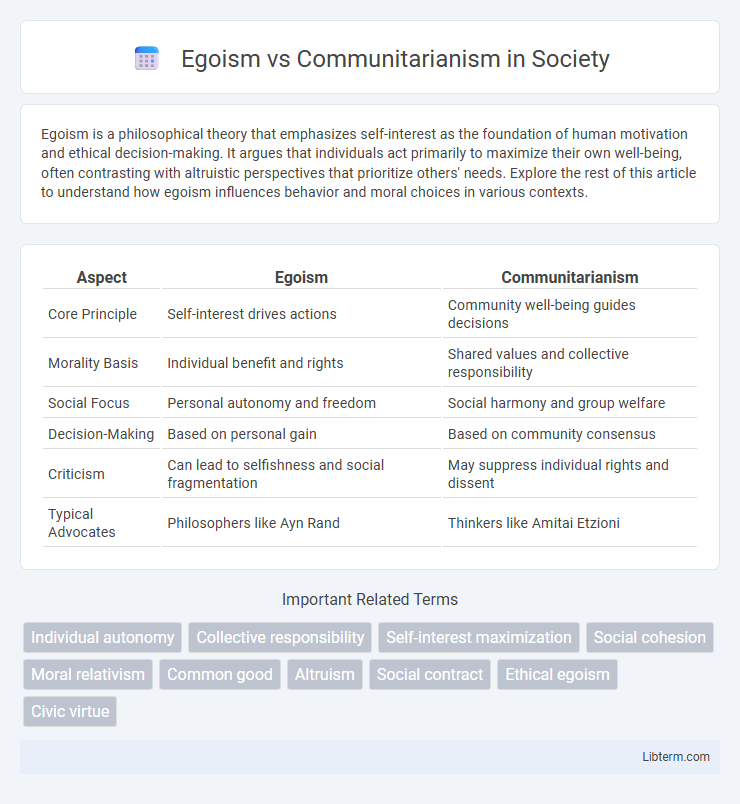Egoism is a philosophical theory that emphasizes self-interest as the foundation of human motivation and ethical decision-making. It argues that individuals act primarily to maximize their own well-being, often contrasting with altruistic perspectives that prioritize others' needs. Explore the rest of this article to understand how egoism influences behavior and moral choices in various contexts.
Table of Comparison
| Aspect | Egoism | Communitarianism |
|---|---|---|
| Core Principle | Self-interest drives actions | Community well-being guides decisions |
| Morality Basis | Individual benefit and rights | Shared values and collective responsibility |
| Social Focus | Personal autonomy and freedom | Social harmony and group welfare |
| Decision-Making | Based on personal gain | Based on community consensus |
| Criticism | Can lead to selfishness and social fragmentation | May suppress individual rights and dissent |
| Typical Advocates | Philosophers like Ayn Rand | Thinkers like Amitai Etzioni |
Understanding Egoism: Core Principles
Egoism centers on the principle that individuals act primarily in their own self-interest, emphasizing personal well-being and autonomy as key motivations. This ethical framework asserts that moral decisions are best guided by the pursuit of one's own happiness and benefits, often aligning with rational self-interest. Egoism contrasts sharply with communitarianism by prioritizing individual goals over collective community values and social obligations.
Communitarianism Explained: Key Concepts
Communitarianism emphasizes the importance of community values, social cohesion, and collective responsibility over individual self-interest. It advocates for the integration of individual rights with communal norms, promoting the well-being of society through shared goals and mutual support. Central concepts include social virtues, moral obligations to the community, and the belief that individual identity is shaped by social contexts.
Historical Origins of Egoism and Communitarianism
Egoism traces its historical origins to ancient Greek philosophy, notably the works of Epicurus and later Hobbes, emphasizing individual self-interest as the primary motivator for human behavior. Communitarianism emerged as a response to liberal individualism in the 20th century, drawing from Aristotelian ethics and the social philosophies of Hegel and MacIntyre, which stress the importance of community values and social cohesion. Both ideologies reflect contrasting views on the balance between individual rights and communal responsibilities throughout history.
Individual Rights vs. Collective Good
Egoism emphasizes individual rights, asserting that personal interests and autonomy should be prioritized to foster self-fulfillment and freedom. Communitarianism advocates for the collective good, valuating social responsibilities and community well-being over isolated individual desires. The tension between these philosophies centers on balancing personal liberties with communal obligations to create ethical and sustainable societies.
Ethical Foundations: Comparing Moral Frameworks
Egoism emphasizes individual rights and self-interest as the primary basis for ethical decision-making, asserting that actions are morally right if they benefit oneself. Communitarianism, in contrast, centers on the values and goals of the community, prioritizing social cohesion and collective well-being over individual autonomy. These moral frameworks differ fundamentally in their ethical foundations, with egoism rooted in personal responsibility and communitarianism based on shared values and social obligations.
Real-World Applications in Policy and Society
Egoism in policy emphasizes individual rights and personal responsibility, influencing libertarian approaches that favor minimal government intervention and free-market economies. Communitarianism shapes policies promoting social welfare, public health, and community engagement, advocating for collective responsibility and social cohesion. Real-world applications include healthcare systems balancing individual choice with community health mandates and environmental regulations prioritizing communal sustainability over individual profit.
Psychological Motivations Behind Egoism
Psychological motivations behind egoism stem from intrinsic self-interest, where individuals prioritize personal goals and well-being, driven by survival instincts and the quest for autonomy. This perspective emphasizes that decision-making is rooted in maximizing one's own benefit, often influenced by cognitive biases such as self-serving bias and the need for self-justification. Contrasting with communitarianism's focus on social harmony, egoism highlights the role of individual psychological needs like self-esteem, control, and personal identity in shaping behavior.
Community Values and Social Cohesion
Community values foster social cohesion by emphasizing shared responsibilities and collective well-being, contrasting with egoism's focus on individual self-interest. Communitarianism promotes cooperation and mutual support, strengthening social bonds and creating a sense of belonging within groups. This collective approach enhances societal stability and resilience by prioritizing common goals over personal gain.
Criticisms and Challenges of Each Viewpoint
Egoism faces criticism for promoting self-interest at the expense of social cooperation, often leading to ethical conflicts and undermining collective well-being. Communitarianism is challenged for potentially suppressing individual rights and autonomy in favor of community values, risking conformity and marginalization of dissenting voices. Both viewpoints struggle to balance personal freedoms with social responsibilities, highlighting tensions between individualism and collective interests.
Finding Balance: Integrative Approaches
Finding balance between egoism and communitarianism involves integrating self-interest with collective well-being, emphasizing ethical frameworks like moral pluralism and social contract theory. Approaches such as mutualism and relational ethics promote cooperation while respecting individual autonomy, fostering social cohesion without sacrificing personal rights. Pragmatic models in political philosophy prioritize policies that encourage shared responsibilities alongside individual freedoms to achieve sustainable societal harmony.
Egoism Infographic

 libterm.com
libterm.com